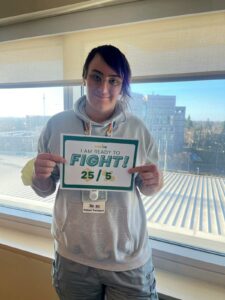Maya is Union Strong and Proud

For Maya Burr, our current political moment calls on us to have each other’s backs. “In the face of being targeted so aggressively in so many states,” they declare, “I am going to stand tall with my queer family and my union siblings.” Queer folks and unions are experiencing a wave of legislative attacks across the United States. Maya, who is trans, wouldn’t be safe in half of the country due to the criminalization of trans, non-binary, and gender non-conforming people. And as they point out, “we are not talking about a fringe group, but mainstream conservative values. Even in California—the most accepting state—there is still pushback and discrimination.” Unions are facing their own adversity. “Governments and corporations are trying to gut unions with right-to-work laws,” explains Maya. The rights of workers, trans people, and trans workers must be protected, and, according to them,“it is through a union’s power of self-respect and collective respect to stand up for ourselves instead of taking the abuse” that will make all the difference.
At work, it is evident to Maya, a Patient Care Transporter, how the University of California could do better for us. “Patient care is really suffering. Patients are waiting long hours for transportation and rooms because our department and EVS are shortstaffed,” they state. Patient Care Transporters make patients feel comfortable, they check in with nurses to ensure patients have their medications before procedures, they establish that patients are not in pain, and relay any needs to the care team. Workers, says Maya, “try to provide the high quality care, but we are being run to the ground—seeing 50-70 patients a day while being exposed to serious illnesses, such as meningitis, tuberculosis, and COVID-19.” Making matters worse, some patient care staff are on doctor-ordered light duty because of the physical toll of being overworked and understaffed. “I have almost gone on light-duty myself. There are times when it feels nearly impossible to get up to go to work. The pain is constant and severe. It interrupts your personal life, so you can’t just clock out and leave your job at your job,” relates Maya.
They want the UC Regents and executives to spend a day in a patient care worker’s shoes. Then, those who govern the University might realize, as Maya puts it, that “workers are on their team and that workers run UC. We’re people with a passion for patient care and their well-being. I wish they’d see that and not just see us as an inconvenient expense on their budget reports.” In the meantime, Maya knows our union’s strength and is excited about our fight for affordability and the upcoming contract negotiations. They outline their priorities for our union as follows, “I want my coworkers and I to continue to have protections. It would be really cool to accomplish $25/5%, even if that doesn’t feel like enough. Contracts with more sick leave would be nice because as hospital workers we get sick a lot.”
Maya doesn’t take our union for granted. They know that a strong union requires all of our consistent involvement. In the face of all the hostility against trans people and unions, there is no backing down. As Maya asserts, “I am proud to be part of our union and the LGBTQIA+ community. Having pride is not some indulgence you celebrate once a year. It is survival.”
Maya works in the Emergency Department at the UC Davis Medical Center. They have been an AFSCME 3299 member for 5 years—3 years in the Patient Care Unit and 2 years in the Service Unit, having previously been a Cook at UC Davis. Maya lives in Woodland.


